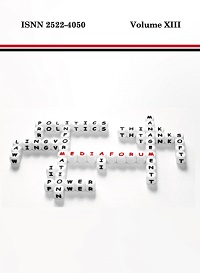The Formation of the Power-Political Mentality in Kyivan Rus against the Background of the Adoption of Christianity
DOI:
https://doi.org/10.31861/mediaforum.2024.14.254-274Keywords:
power, mentality, culture, church, politics, archaicAbstract
The article examines the content and features of the formation of the power-political mentality in Kyivan Rus. It is worth noting that one of the essential moments of political mentality is the process of reflecting in the minds of people the social relations that have developed, the formation of a scheme of perception, and the assessment by people of their position in society. So, if we talk about the methods of studying political mentality, we should first of all talk about the analysis of empirical manifestations of ideologies. Political mentality is associated with various forms of self-organization of society. The multifaceted forms of political life, of which the state (the most significant), the administrative institution, the attitude of people towards political power, the legitimacy of the latter, traditional forms of government, the popularity of political parties and political leaders are all a field where political mentality is revealed.
The political mentality, which is interpreted as an unconscious socio-political identity, at the same time reflects and forms a system of ideas, values, assessments, attitudes, stereotypes, prejudices, motives, symbols, myths, traditions, rituals that have a political color. This internally agreed and externally expressed identity at the level of semiotic models structures political activity, determining its forms and intensity of manifestation. As a result, a specific structure of political mentality is formed, mediated by social ideas and the collective psyche, which determine the types of experiences, patterns of reactions (forms of political activity) and ways of representing political participation and the picture of the world.
The process of formation of the power-political mentality with its named features begins to take shape in Kyivan Rus precisely with the adoption of Christianity (988-989), which became a timely and progressive measure of historical significance. Christianity became an internal spiritual force that united the state. It made it possible to assimilate the highest achievements of world culture, contributed to the expansion of ties with other countries, and the growth of Russia's international authority. In ancient Russian society, a new institution emerged - the church.
Downloads
References
Akhyezer A. 1997. Rossyia: Krytyka ystorycheskoho opыta. Novosybyrsk: Sybyrskyi khronohraf. S. 102-104.
2. Akhyezer A. 2004. Spetsyfyka rossyiskoi tsyvylyzatsyy // Tsyvylyzatsyy. Vыp. 6. M.: Nauka. S. 224-227.
3. Akhyezer A., Kliamkyn Y., Yakovenko Y. 2005. Ystoryia Rossyy: konets yly novoe nachalo? M.: Novoe yzdatelstvo. S. 47-48, 60-64, 65, 98-100.
4. Vernadskyi H. 1927. Nachertanye russkoi ystoryy. Praha. S. 39.
5. Heller M. 1999. Ystoryia Rossyiskoi ymperyy. V 2 t. T. 1. M.: Nauka. S. 24.
6. Neretyna S. 1995. Veruiushchyi razum. K ystoryy srednevekovoi fylosofyy. Arkhanhelsk: Belomor. S. 15.
7. Povist mynulykh lit, 1989// Litopys ruskyi. Kyiv: Dnipro. – S. 56, 591 s.
8. Rychka V. «Vsia korolivska rat» (Vlada Kyivskoi Rusi), 2009. Kyiv.: In-t istorii Ukrainy NAN Ukrainy. 180 s.
9. Tolochko A. Kniaz v Drevnei Rusy: vlast, sobstvennost, ydeolohyia, 2004. Kyiv: Naukova dumka. S. 27, 37-46, 46-54.
10. Tolochko O. Narysy pochatkovoi Rusi, 2015. SPb.: Laurus. 336 s.
11. Franklyn S., Shepard D. Nachalo Rusy. 750-1200, 2000. SPb: «Dmytryi Bulanyn». S. 217, 248-267, 352-382.
12. Freidenberh O. Myr y lyteratura drevnosty, 1988. M.: Nauka. S. 92, 108.
13. Froianov Y. Rabstvo y dannychestvo u vostochnыkh slavian (VI – Kh vv.), 1996. M.: Nauka. S. 87-89.
14. Iakovenko N. Narys istorii serednovichnoi ta rannomodernoi Ukrainy, 2005. Kyiv: Krytyka. – S. 52-62.














